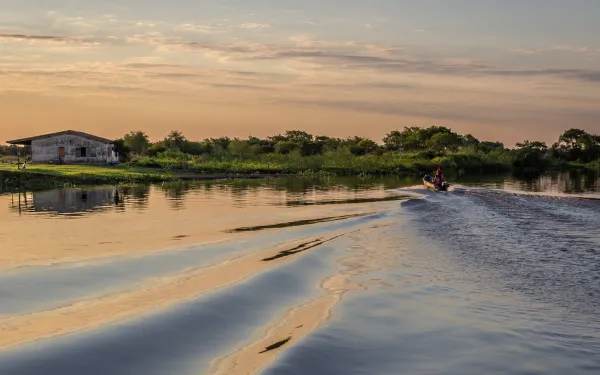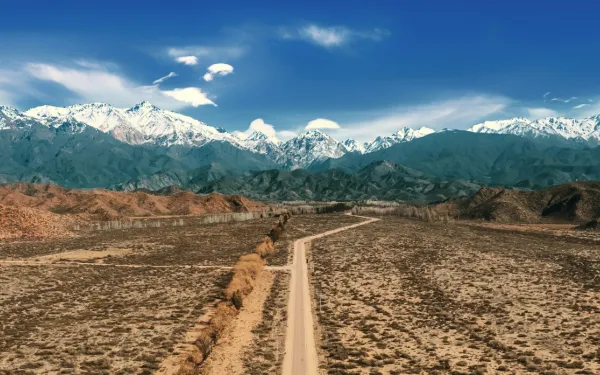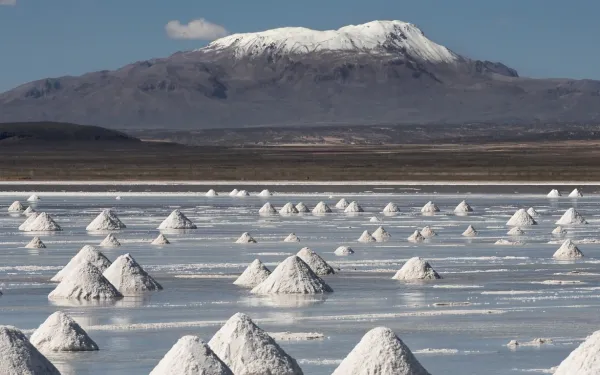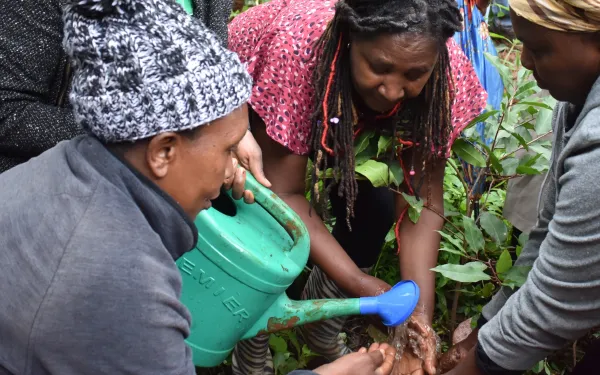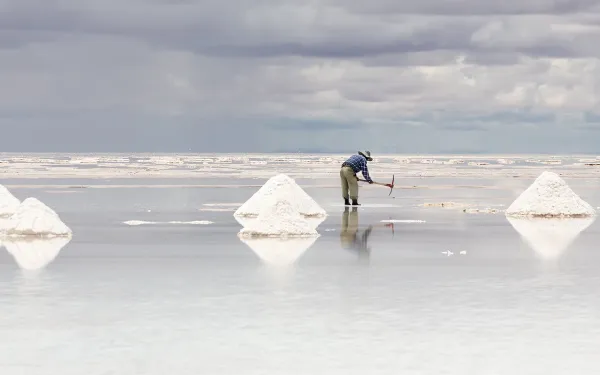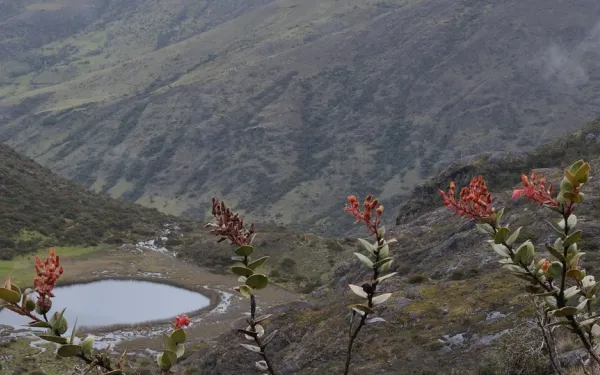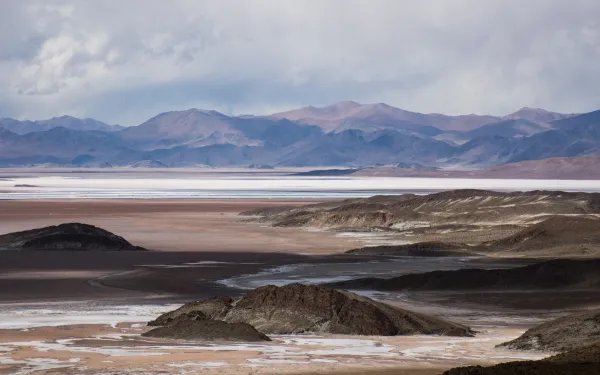
Life in Andean wetlands at risk from extractivism
The expansion of industrial extraction of lithium and other minerals for the energy transition of the global north threatens wetlands in Argentina, Bolivia and Chile. These delicate ecosystems are an abundant source of life and fundamental for human subsistence, environmental balance and for mitigating and adapting to the climate crisis.The Andean wetlands - including salt flats, lakes and lagoons - of Argentina, Bolivia and Chile are at serious risk due to the advance of the extraction of lithium and other minerals demanded for the energy transition in the countries of the global north. The Andean Wetlands Alliance warns of this threat to these ecosystems where life abounds and which are key to human subsistence and biodiversity in general and to the fight against the climate crisis.This year, the Convention on Wetlands proposes as the theme for World Wetlands Day: “Protecting wetlands for our common future”. This theme highlights the importance of collective action to protect these ecosystems, on which the future of humanity depends.According to United Nations data, although they cover only 6% of the earth's surface, wetlands are home to 40% of all plant and animal species. And, worldwide, more than 1 billion people (one eighth of the Earth's population) live in rural and urban areas that depend on these ecosystems for their livelihoods. However, with a 35% global loss in the last 50 years (since 1970), wetlands are the most threatened ecosystem, disappearing three times faster than forests.In Latin America, the Andean wetlands of the Gran Atacama region - located in the border area of Argentina, Bolivia and Chile - are home to unique species of flora and fauna, especially adapted to extreme climatic conditions, as well as microorganisms that absorb carbon dioxide and release oxygen. Its high capacity to purify and store water guarantees the supply of the resource for communities and species, also generating conditions for adaptation to the climate crisis.However, due to the presence of large quantities of lithium in these wetlands - the three countries concentrate more than 53% of the resources (potentially exploitable material) of the mineral - there is great pressure on them: corporate and state actors have developed a growing and massive mining industry to meet the demand for lithium in the global north, oriented to the manufacture of electric vehicles and energy storage from renewable sources, among other purposes.On the other hand, national and provincial governments see the industry as an opportunity to attract investment and strengthen their economies, for which they relax or poorly implement regulations that require an adequate analysis of the environmental and social impacts of projects. Likewise, there are no processes of consultation and free, prior and informed consent with the indigenous communities living in the territories. Nor are the rights of access to information, citizen participation, access to justice in environmental matters, or a safe environment for environmental defenders guaranteed.One of the main impacts of this type of mining (lithium extraction) is on water, a central element of Andean wetlands. Lithium is extracted from the water beneath the salt flats, a process that requires both saltwater and freshwater. Andean wetlands exist in regions where survival depends on the scarce water that defines them. The expansion of extractivism in the Gran Atacama regionArgentinaAccording to official data, the country has a portfolio of more than 50 lithium projects in different stages of progress, mainly located in the provinces of Salta, Catamarca and Jujuy. Three of them are in production and export stage (a fourth project started production in July 2024), four are under construction and more than 40 are at different stages of progress (prospecting/exploration/feasibility), mostly in advanced exploration phase. In Salta and Jujuy operate large companies such as Pan American Energy, Pluspetrol and Tecpetrol, historically linked to the oil and gas industry, which are now expanding their presence in renewable energy sectors, with a marked interest in lithium extraction.However, through an amparo action filed against the authorities and government of the province of Jujuy, it has come to light that there are more than 40 mining projects in the Salinas Grandes Basin and Guayatayoc Lagoon alone, an endorheic basin where more than thirty native communities belonging to the Kolla and Atacama peoples/nations live. To date, their progress and whether there are other projects is unknown because access to public environmental information is restricted and is not provided in a complete and timely manner, in breach of national regulations and international standards. In the Salar del Hombre Muerto, Catamarca, is the oldest lithium mining enclave in the country. The salt flat has been exploited since 1996 by the company Livent (now Arcadium Lithium), causing the total and irreversible drying up of the vega of the Trapiche River. In March 2024, the Supreme Court of Catamarca ordered a halt to mining activity in this salar until a cumulative environmental impact assessment is conducted. BoliviaIn the Salar de Uyuni, the largest in the world, resources of 23 million tons of lithium have been identified. And there are 26 other salt flats that, by regulation, are reserved for the exploitation of the mineral; exploration activities are being carried out in six of them. In Bolivia, lithium is state-owned. The country has a state-owned exploitation plant that began operating in 2024 at 20% of its capacity. In 2012 and 2018, two public consultations were held for state-owned plants, but these excluded indigenous and native communities with titled collective lands. Some communities have informally denounced a significant depletion of springs and water wells. The degradation of the Salar de Chalviri and the overexploitation of lithium and boron in the Salar de Capina have also been denounced.Since 2023, agreements have been signed and exploration and camp installation activities have begun with one Russian and two Chinese companies. These agreements have resulted in two contracts, signed at the end of 2024 and pending approval by the Legislative Assembly, with the Russian company Uranium One Group for a plant in the Salar de Uyuni and with the Chinese consortium CBC Hong Kong (CATL-BRUMP-CMOC companies) for two other plants in the same salar. Also at the end of last year, a second international call was launched for the exploitation of four other salt flats (Empexa, Capina, Cañapa and Chiguana), which has resulted in the signing of agreements with the companies EAU Lithium Pty Ltd (Australia), Tecpetrol S.A. (Argentina) and Geolith Actaris (France). These agreements, contracts and processes have been developed without prior consultation processes and with a lack of transparency. ChileThe Salar de Atacama basin is home to more than 90% of Chile's lithium reserves and was one of the first to be exploited by the mining industry. Currently, there are four major mining operations in the Salar Atacama, located in the Antofagasta Region: lithium extraction by Sociedad Química y Minera de Chile (SQM) and Albemaerle, under contracts with the Corporación de Fomento de la Producción (CORFO), which involves the extraction of more than 2,000 liters of water per second; and the parallel extraction of copper by Minera Escondida and Minera Zaldívar, which extract more than 1,400 liters of fresh water per second, aggravating the already critical water crisis in the area. The Atacameño Community of Peine, who live in the salar basin, has taken legal action denouncing the overexploitation of their aquifers, while in Calama, citizen movements are demanding water governance in the face of uncontrolled extraction by mining companies. In 2015, a government-appointed committee recognized that brine extraction has adverse effects on the ecosystem, but instead of regulating its use, it confirmed the government's long-standing policy of regulating lithium production.In Chile, the government has exclusive property rights over lithium under Decree Law 2886 (1979). This means that state institutions, particularly CORFO, set the conditions under which private companies operate in the salars. In 1979, following U.S. directives, the Chilean government - the dictatorship of Augusto Pinochet - declared lithium a “strategic mineral” and took measures to safeguard long-term reserves by limiting production through quotas accredited by the Chilean Nuclear Energy Commission.The National Lithium Strategy, launched in 2023, seeks to expand state exploitation, including new projects in the Maricunga and Pedernales salt flats. Chile concentrates 36% of global lithium production and, with at least 31 new green hydrogen projects in the pipeline, pressure on water resources will increase exponentially. It is known that, since 2013, on SQM's property, 32.4% of the carob trees (Prosopis chilenis) have dried up due to lack of water. The carob tree is a native tree, resistant to drought and with very deep roots that allow it to survive in this environment. Press contacts Víctor Quintanilla, Interamerican Association for Environmental Defense (AIDA), [email protected], +52 5570522107Rocío Wischñevsky, Fundación Ambiente y Recursos Naturales (FARN), Argentina, [email protected], +54 1159518538Verónica Gostissa, Asamblea Pucará (Argentina), [email protected], +54 93834771717Juan Donoso, Formando Rutas (Chile), [email protected], +4915780743628
Read more
